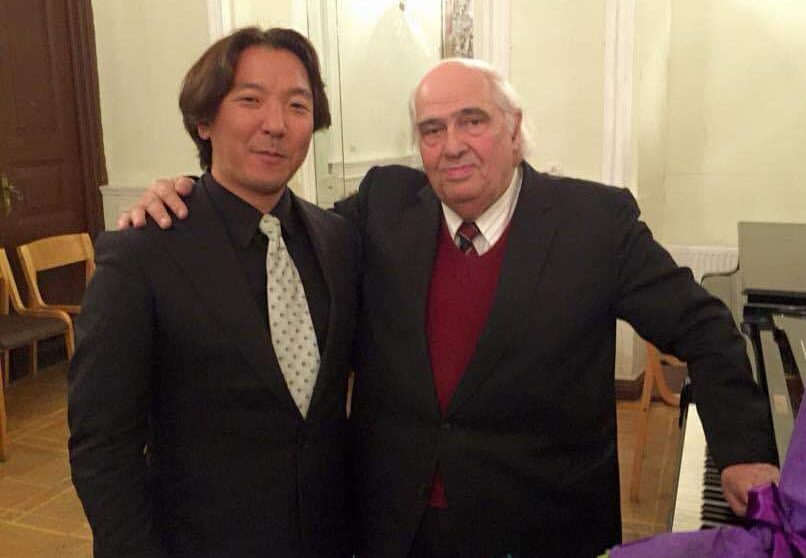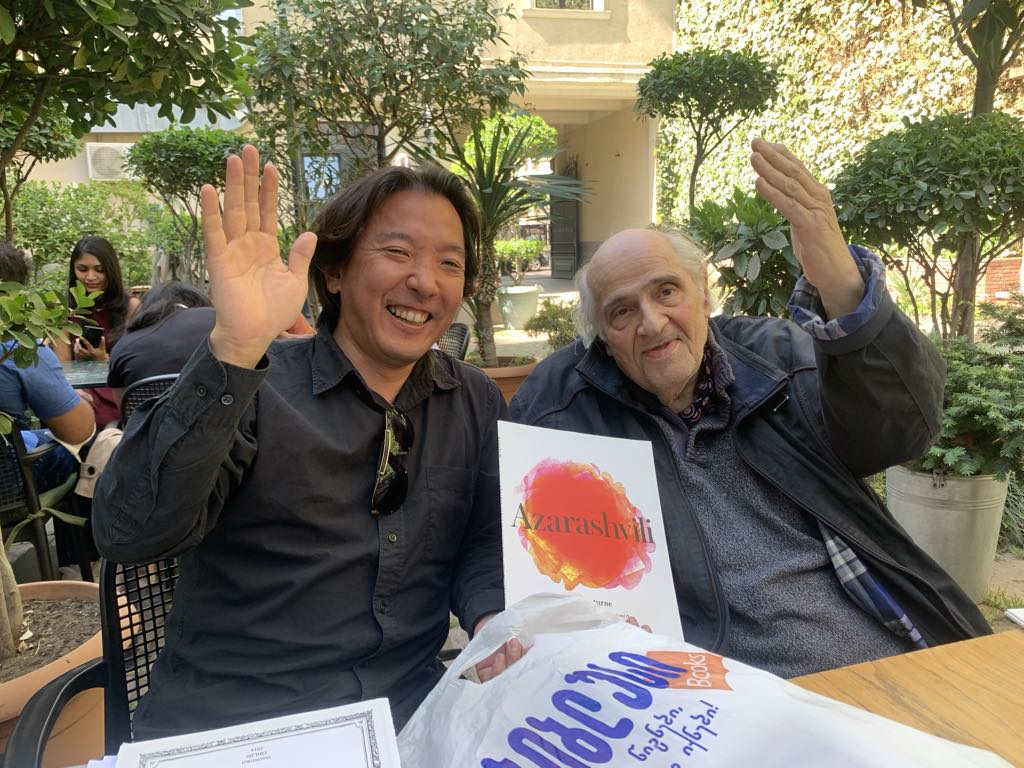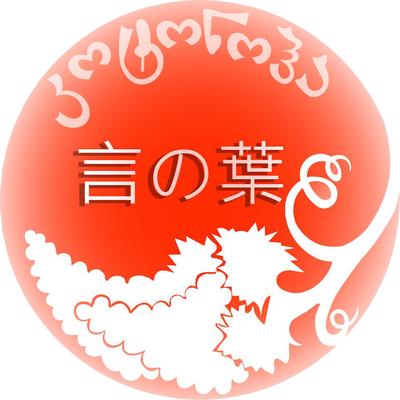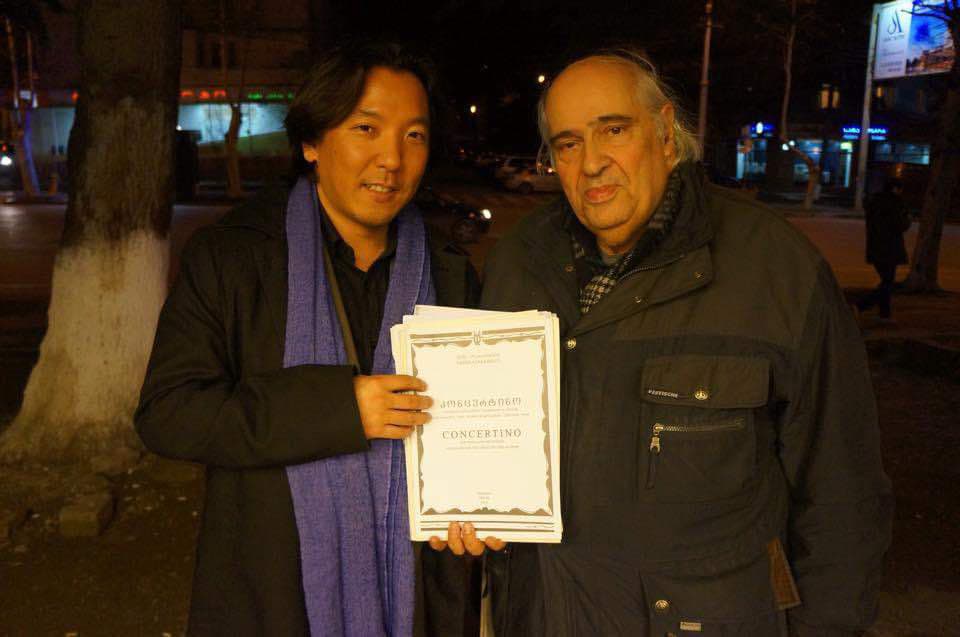【Profile】
After graduating from the Tokyo University of the Arts Music High School and the same university, Mr. Usui further honed his skills at the Mozarteum University of Salzburg. He has received numerous awards, including a prize at the Viotti International Music Competition, the Donemus Performance Award at the Netherlands Music Session, the Special Prize for Contemporary Art from the Vienna Contemporary Avant-Garde Art Group TAMAMU, and first place at the Cantu International Music Competition. In recent years, he has been honored with the Foreign Minister’s Commendation in 2017 and the 3rd Taneda Santoka Award, also granted the title of Honorary Citizen by the city of Sighnaghi in Georgia. Mr. Usui has been fully entrusted with the global copyright management by Georgia’s legendary composer, Vazha Azarashvili. He has served as a visiting associate professor at Shobi University and a visiting professor at Ueno Gakuen University. Currently, He is the representative director of the Yokohama Sinfonietta and the chairman of the Japan-Hong Kong Music Association (Hong Kong) and has been also nurturing many pianists and international competition winners..
―― How did you find out about Georgia?
Usui Toshiki:
Since elementary and middle school, I have always been intrigued by the term “Georgian Military Road” that I learned about in social studies. When a friend informed me that he would be transferred to Georgia, I thought it would be a great opportunity to see the Georgian Military Road, and that was the beginning of my connection with the country in 2015.
I am the representative of the Yokohama Sinfonietta, an orchestra led by the world-renowned conductor Kazuki Yamada, who resides in Berlin. It is well-known that Kazuki Yamada was inspired to become a conductor after being profoundly moved by Vazha Azarashvili’s “Song without Words,” which he heard on an Austrian Airlines in-flight audio program. Since then, he was searching for Mr Azarashvili over 20 years through various means. I vividly remember how I was able to connect with Mr. Azarashvili during my first visit to Georgia, feeling a deep sense of destiny.

―― What kind of relationship did you have with Mr. Vazha Azarashvili?
Usui Toshiki:
My first encounter with Mr. Azarashvili was at Vaso Godziashvili Park, where there is also a Japanese memorial. We met in front of the memorial. Until I came to Georgia, I did not know much about Mr. Azarashvili. However, as I spoke with him, I felt a strong connection to the melodies of his compositions and sensed his great potential. I was convinced that his work would be greatly appreciated both in Japan and worldwide.
Since then, I have visited Georgia every few months, performing Mr. Azarashvili’s pieces at concerts and deepening our friendship by drinking wine together at various Supras. Each time, I became more certain that Japanese people would love his work and that it should be preserved for future generations.
Mr. Azarashvili’s “Song without Words” and “Nocturne” have already been embraced by audiences not only in Japan but around the world. Some of his pieces are even suitable for children to play, which suggests they will gain even more popularity. When I spoke with Mr. Azarashvili, he mentioned that copyright management had not been properly handled since the Soviet era. We were able to complete the formal copyright arrangements and procedures on the Japanese side.
As we continued our discussions, I offered to manage his copyrights. One day, while we were drinking together in a Georgian wine cellar, Mr. Azarashvili told me, “I trust you completely, so I will leave everything to you.” The Greek ambassador was also present at that time, and we signed the documents on the spot. Since I am not an expert in copyright management, I conducted extensive research and decided to seek assistance from Zen-On Music Company, a major Japanese music publisher.

―― Could you tell us about your musical activities around Georgia and your impressions of Georgia’s music culture?
Usui Toshiki:
When classical music was first introduced to Japan, there was a pianist named Alexander Tcherepnin who was also active in Georgia. Tcherepnin taught many Japanese composers, including Akira Ifukube, and made significant contributions. Very few Japanese people know this story. Although it may seem like a re-importation, performing the works of Japanese composers who were greatly influenced by Tcherepnin in Georgia is meaningful.
There are many top artists from Georgia who are active worldwide. When I visit local cities in Georgia to perform, I am amazed by the potential of many young Georgian musicians. The training system from the Soviet era and the current Western training system work well together, creating a fertile ground for nurturing talent in Georgia.
―― Sadly, Mr. Azarashvili has passed away, but how do you plan to continue your activities between Japan and Georgia in the future?
Usui Toshiki:
First of all, it may be quite analog, but increasing the time spent in Georgia is essential. Meeting various people and deepening exchanges with Georgian musicians who are not well-known worldwide is important. Most of my encounters in Georgia, including with Mr. Azarashvili, happened by chance. In Georgia, it often happens that everything connects without any planning, which is quite surprising. This is the Georgian way. I want to continue these interactions and expand my network in Georgia. Additionally, I plan to continue publishing works related to Mr. Azarashvili.



